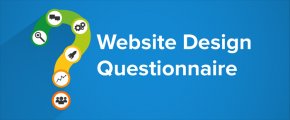
 Designing and developing a website for a client is a big project – and one that can have a big impact on your client’s bottom line. To ensure a happy client, and encourage repeat business, it’s best to gather as much information as you can in the beginning of the process. The more information you can gather with a few web design questions, the better you’ll be able to set expectations about the pace and scope of the project. This simple – and brief! – website design questionnaire will help focus your project and make it easier to deliver a high quality and successful website to your client. Ask these seven web design questions during your next client meeting before you begin designing.
Designing and developing a website for a client is a big project – and one that can have a big impact on your client’s bottom line. To ensure a happy client, and encourage repeat business, it’s best to gather as much information as you can in the beginning of the process. The more information you can gather with a few web design questions, the better you’ll be able to set expectations about the pace and scope of the project. This simple – and brief! – website design questionnaire will help focus your project and make it easier to deliver a high quality and successful website to your client. Ask these seven web design questions during your next client meeting before you begin designing.
- What is your business and how do you set yourself apart from your competitors?
- Before you begin thinking about the design and functionality of a website, you first need to understand your client. You have probably already done research to learn as much information as you can about the client prior to the first meeting, but it’s always enlightening to hear how clients describe their own business as well as their competitors’. Ask the client to describe their business’ ‘differentiators, ’ or unique features that distinguish them in the market. These can range from product-related advantages to organizational attributes. For example:
- Superior Product or Service
- Technological Advantage
- Lowest Pricing / Most Value
- Industry / Audience / Geographic Specialization
- Unique / Most Efficient Process or Business Model
- Notably Attractive or Desirable Culture
- Proprietary Expertise or Knowledge
- Remarkable Level of Customer Service
If your client is having trouble pinpointing their differentiators, ask them a few questions to help narrow it down. Are they the best at providing a particular product or service? Is there something in the composition of their business model that makes them exceptionally valuable, special, or irreplaceable compared to competitors? Asking these questions will help you understand how the client sees their business and how they position it in the market, allowing you to shape the design and content of their website to match. In addition, compiling a competitor analysis before the meeting, or asking the client if they already have one you can reference, can help guide this discussion.
- Before you begin thinking about the design and functionality of a website, you first need to understand your client. You have probably already done research to learn as much information as you can about the client prior to the first meeting, but it’s always enlightening to hear how clients describe their own business as well as their competitors’. Ask the client to describe their business’ ‘differentiators, ’ or unique features that distinguish them in the market. These can range from product-related advantages to organizational attributes. For example:
- How would you describe your brand’s personality?
- One of the most important aspects of designing a website for a client is sticking true to their brand. However, asking the client to describe their brand may not be a very fruitful question. While it’s highly likely your client has a solid understanding of their brand, articulating it when asked might be difficult. Instead, ask your client what impression they want to make on website visitors.
Before you begin the design of a website, ask your client what impression they want to make on website visitors.
Their answer to that question will help you create or fine-tune their brand personality and voice. In addition to asking your client this question, you might also ask to look at any other branded materials they currently use and like, such as business cards, letterhead, or brochures, to get a better understanding of their brand.
- One of the most important aspects of designing a website for a client is sticking true to their brand. However, asking the client to describe their brand may not be a very fruitful question. While it’s highly likely your client has a solid understanding of their brand, articulating it when asked might be difficult. Instead, ask your client what impression they want to make on website visitors.
- Who is your target market or audience?
- Ask your client to describe their target customer, or the type of person they are hoping will visit their website. If your client is unsure about who their target audience is, you can help them narrow it down by asking a few questions:
- What needs do your products or services fulfill?
- What kinds of people (age, gender, industry) might have those needs?
- What specific characteristics (job history, personal preferences, goals) describe the people that might have those needs?
Gathering this kind of data essentially creates a persona, or a model of the ideal individual you want to attract to your client’s site. Persona has become an incredibly trendy word, not only in the marketing industry, but in the digital agency space as well. The concept can be extremely helpful in crafting targeted content. Creating a highly specific persona with the above questions will help you design the site with that ideal individual in mind. Persona-driven design increases the probability of achieving your client’s goals for the site, be it conversions, leads, or even brand awareness.
- Ask your client to describe their target customer, or the type of person they are hoping will visit their website. If your client is unsure about who their target audience is, you can help them narrow it down by asking a few questions:
- What are your goals for the new website and how will you measure your success?
- Every website needs a purpose – although your client might not be clear on what their purpose should be. It’s your job to help the client narrow down the specific goals they have for their website and to help them determine how to measure their success.
Pinpoint your client’s goals for the site by asking what they want their customer to do once they visit the site.
Some examples of goals include brand awareness, educating their target audience, collecting leads, selling their goods or services, and encouraging on-site or social media interaction. Of course, many websites have more than one goal, but prioritizing these goals is important for a focused and successful design (and will help you begin a list of the different features the website will need). In addition, as you develop your client’s goals, don’t forget to discuss how the success of each goal will be measured after launch.
- Every website needs a purpose – although your client might not be clear on what their purpose should be. It’s your job to help the client narrow down the specific goals they have for their website and to help them determine how to measure their success.
- What are the most important functions your website needs to have?
- The first four questions in this list are critical in building the foundation of your client’s website – they will add personality, emotion, and depth to your design. Only after you gather the above information should you shift your focus to the details of website functionality. Conveniently, the answers you glean from the previous questions should have already started a list of potential features.
Don’t discuss website functionality until you have a solid understanding of your client’s brand, target customer, and goals.
With this question, however, you can build a long list of feature and functionality “wants” and then work with the client to prioritize them. To develop this list and help the client prioritize which features are most important to them, it might be helpful to go through examples of other websites in the industry, including their competitors, and have your client point out features they both like and dislike. Make sure they understand which features are easy to include and which will require a bigger investment of time and money. When it comes time to present them with a final proposal, you might want to keep their whole list of features in mind and make a note that added features later on may result in added costs.
- The first four questions in this list are critical in building the foundation of your client’s website – they will add personality, emotion, and depth to your design. Only after you gather the above information should you shift your focus to the details of website functionality. Conveniently, the answers you glean from the previous questions should have already started a list of potential features.
- How do you plan to manage the website after it is live?
- Choosing the underlying platform for the website, of course, depends on the site’s intended usage. For example, the need for regularly updated content and multiple admins screams CMS, while an e-commerce strategy will require some sort of shopping cart.
Your agency knows how to match the site’s functions to the best platform and it is, without a doubt, equally important to take the client’s capabilities and intentions for post-launch management of the site into consideration. A client that has no interest or need to manage their website might need to be presented with a post-launch proposal that lays out how your agency will handle and charge for future updates to the site.
On the other hand, a client that either needs or wants some control of their website post-launch will need to be walked through the various options for building their site and how those options fit into their management capabilities. If a CMS is an option, you can use our article on choosing a CMS to help explain the differences between the most popular choices. You can also ask these questions to figure out which CMS fits your client best. Of course, once the site is ready to launch, you might consider organizing a training session to ensure your client is fully capable of updating and managing their site post launch.
- Choosing the underlying platform for the website, of course, depends on the site’s intended usage. For example, the need for regularly updated content and multiple admins screams CMS, while an e-commerce strategy will require some sort of shopping cart.
- Do you have a registrar or web host chosen? If not, what are you looking for in a web host?
- It’s never too early to discuss the back-end details of the website. Your agency might have a preferred web host and domain registrar, but it still helps to find out if the...
INTERESTING VIDEO












